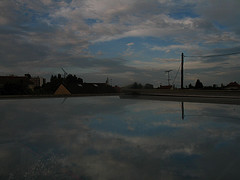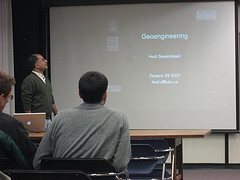August 25th, 2009 by Eugene Barsky | No Comments »

I have posted about climate engineering before. Here is the new article from the last issue of Science that discusses the risks of climate engineering – “Risks of Climate Engineering”
Risks of Climate Engineering
Gabriele C. Hegerl and Susan Solomon (21 August 2009)
Science 325 (5943), 955. [DOI: 10.1126/science.1178530]
This short opinion article presents the points against temperature changes potentially caused by geoengineering…
** photo by http://www.flickr.com/photos/courambel/
Posted in Atmospheric Science, Chemical and Biological Engineering, Earth and Ocean Sciences, General Science, Geography, Main, Physics | No Comments »
July 20th, 2009 by Eugene Barsky | No Comments »

New Scientist reports about the final draft of the American Meteorological Society‘s carefully worded position paper on geoengineering. The AMS is the first major scientific body to officially endorse research into geoengineering.
From New Scientist:
The document states that “deliberately manipulating physical, chemical, or biological aspects of the Earth system” should be explored alongside the more conventional approaches to climate change. Conventional approaches means reducing emissions – “mitigation” in policy-speak – and adjusting to the unavoidable effect of climate change – known as “adaptation”.
The paper states that “even aggressive mitigation of future emissions cannot avoid dangerous climate changes resulting from past emissions. Furthermore, it is unlikely that all of the expected climate-change impacts can be managed through adaptation. Thus, it is prudent to consider geoengineering’s potential benefits, to understand its limitations, and to avoid ill-considered deployment”.
http://www.newscientist.com/article/dn17490-climate-engineering-research-gets-green-light.html?DCMP=OTC-rss&nsref=online-news
** photo by courambel
Posted in Atmospheric Science, Chemical and Biological Engineering, Chemistry, Earth and Ocean Sciences, General Science, Geography, Main, Materials Engineering, Physics, Uncategorized | No Comments »
May 4th, 2009 by Eugene Barsky | No Comments »

Maclean’s has featured an article last week on geoengineering – http://www2.macleans.ca/2009/04/22/plan-b-for-global-warming/
The article focused on work of David Keith from UofC. His main article on geoengineering – “Geoengineering the climate: History and prospect” can be found here (in full text PDF for UBC folks)
A quick search in Web of Science database shows that every year there are twice as many article on this topic than a previous year…
Here are some folks in UBC Applied Sciences that work in this area
** Photo by freedryk
Posted in Atmospheric Science, Chemistry, Earth and Ocean Sciences, General Science, Geography, Main, Mechanical Engineering, News, Science - undegraduate classes | No Comments »
April 16th, 2010 by Kevin Lindstrom | No Comments »
In one of the classic understatements of aviation history, Eric Moody turned on the flight intercom of his British Airways 747 and reported to his 248 passengers:
Ladies and gentlemen, this is your captain speaking. We have a small problem. All four engines have stopped. We are doing our damnedest to get them under control. I trust you are not in too much distress.
The date was 24 June 1982, and Moody’s 747 was south of Java, en route from Heathrow to Auckland, amidst an ash cloud from Mount Galunggung in Indonesia. At first it looked as if the only hope was to ditch the plane in the ocean. However, the crew was able to glide the plane (let’s all nod now to engineers who managed to create a jumbo jet that descends only one meter for every 15 flown without power) until successfully restarting three of the four engines, but the damage from the cloud made for a harrowing landing over the mountainous terrain around Jakarta. In 1989, another 747 temporarily lost use of all four engines due to a volcanic plume (from Alaska’s Mt. Redoubt).
Not surprisingly, since the British Airways incident, volcanic plumes—previously studied more closely for their climatic effects—have become a preoccupation of weather forecasters. The world meteorological and aviation communities have collaborated on the International Airways Volcano Watch, whose advisories Thursday led to the cancellation of flights across northern Europe due to the eruption of Iceland’s Eyjafjalla volcano. It will be hard to overstate the consequence of this eruption for travelers around the world; it is already being compared to the no-fly days after 9/11.
For more information, read the full American Meteorological Society Blog Post
The Science and Engineering Library hosts a number of databases that will give you access to the peer-reviewed literature dealing with the effects of volcanic eruptions on climate and weather.
Have a look at
Geobase
MGA
Web of Science
Submitted by Kevin Lindstrom Liaison Librarian for Earth and Ocean Sciences
Posted in Atmospheric Science, Earth and Ocean Sciences, General Science, Geography, Uncategorized | No Comments »
February 20th, 2009 by Kevin Lindstrom | No Comments »
There are wide variety of CO2 calculators available on the web. Here’s a short list.
Government of Canada’s ecoACTION Tools and Calculators
EPA Climate Change – Greenhouse Gas Emissions Personal Emissions Calculator
My Carbon Footprint Carbon Calculator
Umweltbundesamt CO2 Rechner
Submitted by Kevin Lindstrom Liaison Librarian for Earth and Ocean Sciences, Chemical and Biological Engineering, Chemistry, Physics and Astronomy, and Geography.
Posted in Atmospheric Science, Chemical and Biological Engineering, Earth and Ocean Sciences, General Science, Geography, Main, Mechanical Engineering, Science - undegraduate classes | No Comments »
September 12th, 2008 by Kevin Lindstrom | No Comments »
We’ve got ebooks on almost any topic under the sun and pdf’s are a lot lighter to carry than paper.
You want books on how to write code in Python or how to fix your new laptop running Microsoft Vista? Have a look at the Books 24X7 IT Collection.
Trying find some good stuff on biodiesel? Heres’ a hot title
Biodiesel – A Realistic Fuel Alternative for Diesel Engines
Need some physical property data like the viscosity of Cl2 gas? A search of Knovel.com will link you to the Chemical Properties Handbook and Yaws’ Handbook of Thermodynamic and Physical Properties of Chemical Compounds
Need some good information on climate change? Here’s a good starting point Assessing Climate Change.
Circuit diagrams for operational amplifiers? Check out the Electrical Engineering Handbook.
All in all, you have access to more than five thousand science and engineering ebooks.
For a complete list (not including Books24X7 titles) go to the Science & Engineering Ebook site. There you can find A-Z titles lists of ebooks as well as the search interfaces for the ebook collections you have access to. Make sure you look at the Springer Ebooks as well. Springer is a major science and engineering publisher.
Remember that these resources are not freely available on internet, so if you are connecting from off campus, go to UBC’s VPN site for instructions.
Posted by Kevin Lindstrom Liaison Librarian for Earth and Ocean Sciences, Chemistry and Chemical Engineering, Electrical and Computer Engineering, Materials Engineering, and Physics.
Posted in About this blog, Amusing stuff, Atmospheric Science, Chemical and Biological Engineering, Chemistry, Civil Engineering, Earth and Ocean Sciences, General Science, Geography, Main, Materials Engineering, Mathematics, Mechanical Engineering, News, Physics, Podcasts, Science - undegraduate classes, Statistics, Wood Sciences | No Comments »



